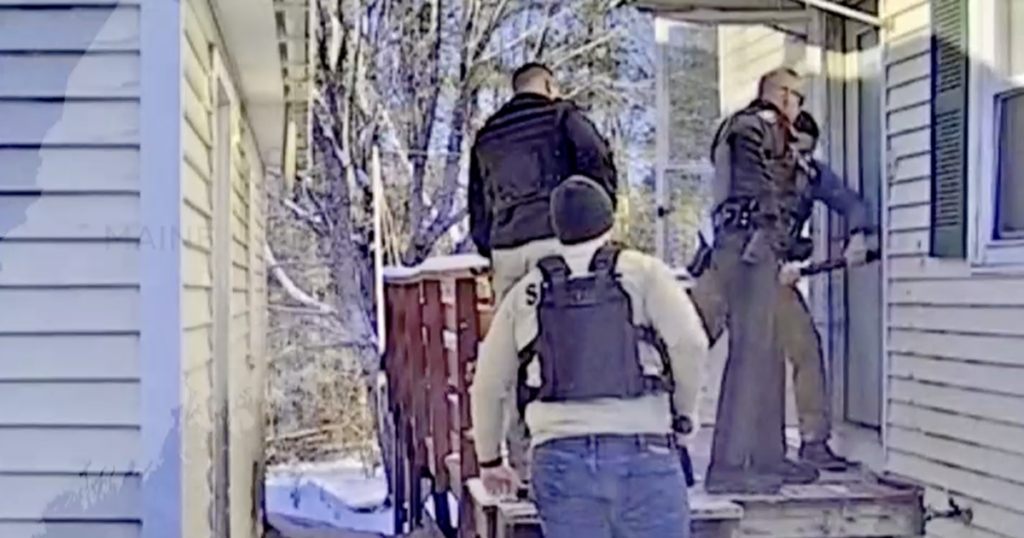Maine is a new frontier for the illegal marijuana trade, with potentially hundreds of suspected unlicensed cultivation facilities operating in the state, a CBS News investigation has found.
This is part of a larger national phenomenon. Thousands of illegal marijuana farms are popping up in states such as Oklahoma, California and Colorado, said Raymond Donovan, former director of operations for the Drug Enforcement Administration.
”[Maine] “The state is a great place to grow cannabis and grow it in a very discreet way,” Donovan told CBS News. Part of the reason is the state’s proximity to major secondary markets in Boston and New York.
In December, after a six-week investigation, Maine law enforcement raided a home in Machias, a rural town on the southeast coast, and discovered a large warehouse containing more than 2,600 plants and 100 pounds of processed and packaged marijuana. Found the facility.
“I’ve been doing this for years, and this was probably the largest indoor marijuana grow operation I’ve ever seen,” Police Chief Keith Mercier said. “It was a very impressive operation.”
Machias Police were assisted by the DEA, FBI, Department of Homeland Security, Office of Cannabis Policy, Maine Drug Enforcement Agency, and Washington County Sheriff’s Department.
“This is a statewide issue,” Mercier said. “According to the information we have, there are currently over 200 active facilities.”
Police in Maine have executed search warrants on at least 34 properties related to illegal marijuana since last June, and investigations are ongoing.
But the most surprising thing about the prevalence of illegal cultivation in Maine’s remote areas may be who is thought to be supporting the operation.
“An essentially international Chinese organized crime network is behind the largest black market marijuana trafficking ring we have ever seen,” Donovan said.
In February, 50 U.S. lawmakers sent a letter to Attorney General Merrick Garland demanding answers about China’s role in illegal marijuana nationwide.
The bipartisan group said it was “deeply concerned by reports from across the country that Chinese nationals and organized crime are growing marijuana on American farmland.”
Donovan said the easiest way to identify illegal marijuana crops is by their power usage, which MainWire editor and Maine native Steve Robinson tracks. Robinson has created a database of suspected illegal marijuana growers in the state.
“These places consume a tremendous amount of power,” he told CBS News. “To handle that amount of energy, we’re going to have to make significant upgrades to our electrical infrastructure. We’re working on specialized electrical equipment that is very rare and difficult to obtain, especially in Maine.”
Mercier said he used one of Robinson’s articles as a training tool on what to look for before executing a search warrant at Machias’ property.
“When I subpoenaed electricity records from the power company, [it] “It was very difficult to explain why someone somewhere would use that amount of power,” he said.
Mercier said the Machias operation uses four to five times more electricity than a typical home. Other tell-tale signs included shuttered windows and complaints from neighbors about pungent odors and suspicious vans coming and going.
Three men were arrested during the operation and charged with illegal cultivation. Police found a Malaysian passport, a Chinese passport and a Brooklyn driver’s license at the scene.
Donovan told CBS News that some Chinese nationals working in marijuana cultivation operations across the country are victims of labor trafficking.
”[They’re] “They were brought here under the auspices of working for a legitimate business, and they are often kept in these locations unwillingly to oversee the cultivation of these marijuana plants. “They will tell you what to do,” he said.
“They worked 24/7 and were paid $1,000 a month,” Mercier said. “I never got the impression that these gentlemen were in charge of anything. They were just strictly there to maintain the product.”
Donovan and other law enforcement officials say some of the same criminal groups behind illegal marijuana participate in a far more dangerous drug trade. Donovan said the DEA first connected organized crime in China to these illegal weed growers. Fentanyl supply chain.
“We quickly realized that the money we were making selling fentanyl on the streets was going back to Chinese brokers in Brooklyn and Queens,” he said. “We started investigating many of these brokers [and] It was observed that they were also involved in marijuana trafficking. ”
Although marijuana remains illegal under federal law, the majority of Americans now live in states where marijuana is legal.Robust market exists for illegal marijuana – state regulations allow sale But demand outstrips supply, opening the market to illegal growers.
Donovan worries that fewer prosecutions could encourage organized crime gangs that traffic marijuana to infiltrate sparsely populated states.
“In places like Maine where marijuana is legal, there’s less scrutiny on marijuana,” he says. “This is a recipe for disaster in the sense that they continue to go to these places and grow.”

